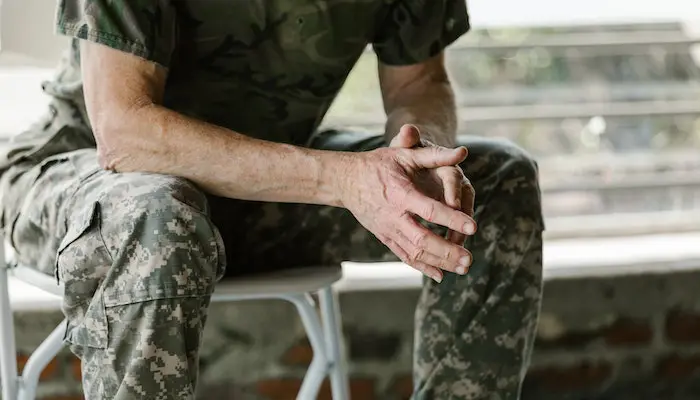
Veterans, who have served their country with valor and sacrifice, often find themselves battling addiction upon returning home. This post explores the reasons behind why veterans struggle with addiction, including the unique challenges they face during and after their service, such as combat-related trauma, physical injuries, and difficulties reintegrating into civilian life. By understanding these factors, we can better support and assist veterans in their journey towards recovery and healing.
Addiction in Veterans
Veterans are a special group of individuals who have selflessly served their country and faced numerous challenges during their time in the military. Unfortunately, many veterans also face another battle upon returning home – addiction. The following delves into the reasons why veterans struggle with addiction and the complexities that contribute to their difficulties in overcoming this issue.
One of the primary reasons why veterans may struggle with addiction is the trauma they experience during their time in the military. Combat exposure, witnessing the horrors of war, and the loss of comrades can lead to post-traumatic stress disorder (PTSD) and other mental health issues. In an attempt to cope with these overwhelming feelings, some veterans turn to substance abuse as a way to numb their pain and memories. For example, a study by the Substance Abuse and Mental Health Services Administration found that veterans with PTSD are at a higher risk for substance abuse than those without PTSD.
Furthermore, physical injuries sustained during military service can also contribute to veterans’ struggles with addiction. Chronic pain from injuries sustained in combat or training can lead to the over-prescription of opioids by healthcare providers, which can then spiral into addiction. According to the Department of Veterans Affairs, veterans are twice as likely to die from accidental opioid overdoses compared to the general population.
Additionally, veterans often face challenges when reintegrating into civilian life after their service. The transition from a highly structured and regimented military environment to the relative freedom of civilian life can be jarring and disorienting. Feelings of isolation, lack of purpose, and difficulty finding employment can all contribute to veterans turning to substance abuse as a way to cope with these challenges.
Addiction Statistics Among Veterans
The statistics of substance abuse among veterans paint a concerning picture of the challenges faced by those who have served in the military. It is essential for society to recognize the prevalence of substance abuse among veterans and to provide effective interventions, resources, and support systems to help veterans overcome their struggles with addiction. By addressing these issues proactively and compassionately, we can assist veterans in their recovery journey and honor their service to our country.
-According to the National Institute on Drug Abuse (NIDA), veterans are more likely to experience substance abuse disorders compared to the general population. Approximately 1 in 10 veterans struggle with substance abuse issues, including alcohol, prescription drugs, and illicit drugs.
-The Substance Abuse and Mental Health Services Administration (SAMHSA) reported that in 2017, around 5.4% of veterans aged 18 or older had a substance use disorder, with alcohol being the most commonly abused substance among veterans.
-Veterans with post-traumatic stress disorder (PTSD) are particularly vulnerable to substance abuse. Studies have shown that veterans with PTSD are more likely to engage in substance abuse as a way to cope with their symptoms and trauma.
-Opioid misuse is a significant concern among veterans, with the Department of Veterans Affairs (VA) reporting that veterans are twice as likely to die from accidental opioid overdoses compared to the general population. The overprescription of opioids for pain management in veterans has contributed to the opioid epidemic within this population.
-Homeless veterans also face high rates of substance abuse, with the VA estimating that around 70% of homeless veterans struggle with substance abuse issues. Substance abuse can be both a cause and a consequence of homelessness among veterans, further complicating their ability to access treatment and support.
Specific Treatments for Veterans Struggling with Substance Abuse
Veterans struggling with substance abuse require specialized treatments that address their unique challenges and experiences. The following explores specific treatment options for veterans facing substance abuse issues, including evidence-based therapies, peer support programs, and holistic approaches that cater to the needs of this population.
Specific Treatments for Veterans Struggling with Substance Abuse:
Evidence-Based Therapies: – Cognitive Behavioral Therapy (CBT): CBT is a widely used therapy that helps veterans identify and change negative thought patterns and behaviors associated with substance abuse. It can also assist in managing co-occurring mental health conditions such as PTSD. – Eye Movement Desensitization and Reprocessing (EMDR): EMDR is an effective therapy for veterans with trauma-related disorders like PTSD. It helps individuals process traumatic memories and reduce distress, which can contribute to substance abuse.
Peer Support Programs: – Veterans Health Administration (VHA) offers peer support programs where veterans can connect with peers who have experienced similar challenges. Peer support can provide a sense of camaraderie, understanding, and encouragement in the recovery process. – Alcoholics Anonymous (AA) and Narcotics Anonymous (NA) meetings specifically for veterans provide a supportive environment where veterans can share their experiences, receive guidance, and build a sober network.
Medication-Assisted Treatment (MAT): – MAT combines medications with behavioral therapies to treat substance use disorders effectively. For veterans struggling with opioid addiction, medications like buprenorphine or naltrexone can help reduce cravings and withdrawal symptoms. – The VA offers MAT programs as part of comprehensive treatment plans for veterans with substance use disorders, ensuring a holistic approach to recovery.
Holistic Approaches: – Mindfulness-Based Stress Reduction (MBSR): MBSR teaches veterans mindfulness techniques to manage stress, anxiety, and cravings associated with substance abuse. It promotes self-awareness and emotional regulation, supporting long-term recovery. – Equine Therapy and Adventure Therapy: These experiential therapies engage veterans in outdoor activities and interactions with animals to promote emotional healing, self-confidence, and interpersonal skills, addressing underlying issues contributing to substance abuse.
Specific treatments tailored to the needs of veterans struggling with substance abuse are crucial in supporting their recovery and well-being. By implementing evidence-based therapies, peer support programs, medication-assisted treatment, and holistic approaches, we can provide comprehensive care that addresses the complexities of substance abuse in the veteran population. It is essential to prioritize the mental health and recovery of veterans who have sacrificed for their country, ensuring they receive the support and resources needed to overcome substance abuse challenges and thrive in their post-service lives.
In Conclusion
In conclusion, veterans struggle with addiction for a myriad of reasons, including combat-related trauma, physical injuries, and difficulties reintegrating into civilian life. It is crucial for society to recognize and address these issues in order to better support and assist veterans in their journey towards recovery and healing. By providing veterans with access to appropriate mental health services, substance abuse treatment programs, and social support networks, we can help them overcome their struggles with addiction and honor their service to our country.
If you or someone you know is struggling with a chemical dependency issue reach out to Genesis Medical Detox or Magnolia Ranch Recovery today and get started on the path to long-term recovery.


















